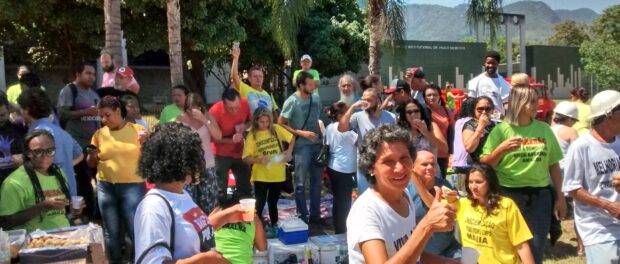
The last event of the Mobilizations Against Evictions series, or “Occupy City Hall: Feast of the Poor” protest on Friday, December 15 gathered residents of favelas currently threatened with eviction for a demonstration in front of Rio’s City Hall. The demonstration intended to show Mayor Marcelo Crivella that the communities will not let up the fight to guarantee their right to remain where they are.
The event brought together leaders and residents of communities from various parts of the city, such as Araçatiba, Rio das Pedras, Horto, Barrinha, and Rádio Sonda. Amid war cries like “if living [in housing] is a privilege, occupying is my right,” those present took the microphone in turns, expressing their motivations for participating in the mobilization.
“We are tired of building the city and then being driven out of it. Tired of living in this city as if we had no right to it,” summarized Sandra Maria, a resident of Vila Autódromo, a community that bravely resisted a long process of removal in the pre-Olympic years. “The favelas will remain in their place of origin, because, yes, the favela wants to be upgraded.”
“Our reason for being here at this demonstration, with this hot sun on our heads, is to see if we can reach the [mayor’s] conscience,” declared José Mauricio Souza da Silva from Rio das Pedras, “We are here imploring him for the right to live in our own homes.”
Rio das Pedras, founded 54 years ago, was threatened with a verticalization plan for that would replace local architecture with 12-story buildings. On the same Friday of the protest, the official municipal gazette announced that the City will no longer carry out the verticalization project. However, other projects that go against the interests of the community, such as the creation of Bus Rapid Transit (BRT) corridors that may result in evictions, remain under consideration.
Representatives of Araçatiba, a small community located in the neighborhood of Guaratiba, also shared their motivations to participate in the action. “We had three houses demolished in a gross and unjust manner. Without an order, without warning, without giving us a day, they arrived and took them down,” shared Ana Frimerman. “And they came saying that they were going to demolish another sixty houses. It is for these other sixty houses that we are fighting here, attempting to get this meeting with Crivella. It’s to end all this injustice.”
In the midst of resistance, there was opportunity to celebrate the unity among the communities. Each protester brought a meal to share for a feast with the others. The day started with breakfast, with cake, bananas, coffee, and sandwiches, and ended with a hearty lunch of corn couscous, roasted chicken, and soda. There was also rabanada (a traditional sweet bread), representing the Christmas spirit of the event.
As the protesters feasted, community leaders expressed dissatisfaction with the mayor’s unwillingness to dialogue with constituents. “I, in addition to voting for him, walked the streets of my favela, saying ‘people, let’s vote for Crivella,'” recalled da Silva. “But unfortunately, this man does not welcome and speak to the people who voted for him.”
Márcia Beatriz Costa of the Brigadas Populares, an organization that works towards the formation of a popular and democratic political regime, sees an inconsistency in the mayor’s religious position. “He calls himself a believer, calls himself a man of God. Where is he now to see the suffering of the people?”
Having lived for 22 years in Barrinha, a favela located in Barra da Tijuca, Maria Geni is also disappointed with the current mayor. “I went to vote with so much love in my heart. I really believed in Crivella and today it’s a disappointment.”
Barrinha’s situation was described by another resident, Janine Castro. “It’s a community that has been hiding for many years, afraid of the public authorities, of powerful real estate interests, and the rich,” she explained. “Enough of living hidden behind walls. We are poor, but we are workers, we are worthy.”
Maria Geni, who was once president of the Residents’ Association, added: “It’s sad. You save the money to pay the builder, but you do not have the money to pay for the cement. You save the money for the cement but then you have to pay the builder.” Geni describes the hard-earned investment that residents make in their homes. “We do things little by little, and then a rich man comes, who does not know what that [sacrifice] means, and undoes everything.”
Near lunchtime, demonstrators closed half the road where Presidente Vargas Avenue meets the Pinto de Azevedo Street. The intervention did not stop the traffic and allowed drivers and passengers to see the messages written on the various banners carried by residents threatened with removal. The banners contained such words as “Evictions, no. Housing, yes” and “let’s resist.” Demonstrators also distributed explanatory pamphlets.
Seeking to inform her fellow demonstrators, Sandra Maria drew attention to various tactics used to carry out forced evictions. “There is one official process of removal and then there is this dirty process of eviction that they do: they exert pressure, pressuring the population until they give up the territory.” To illustrate the latter, she recalled Vila Hípica. “It’s a community with people who are ill, who depend on electricity, who have gone two years without electricity provision, living in subhuman conditions within the city.”
This closing protest event of the Mobilization Against Evictions brought together essential elements of this struggle: resistance, solidarity, and celebration of the unity between threatened communities. Maria Josefa, a resident of Rio das Pedras, captured a sentiment shared by many at the event when she said: “We will not give up. 2017 is just the beginning.”





